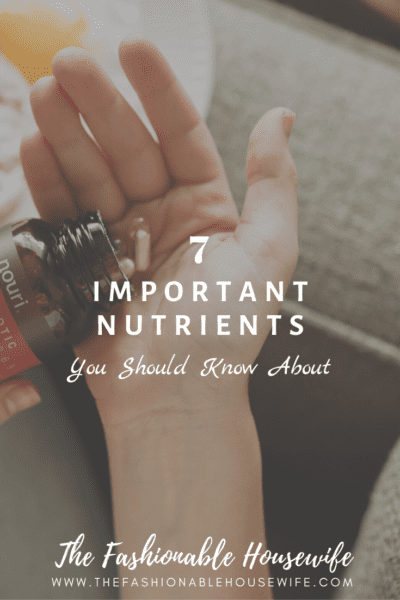
You know you should eat a well-balanced diet, but you may not know what that exactly includes. Key vitamins and minerals should also be a part of your daily diet and lifestyle to make sure you are getting the full range you need to lead a strong, robust life. You probably already know how important calcium and vitamin D are. Here are seven other vitamins and nutrients you should know about.
Peptides
Peptide therapy is a popular health and beauty trend to take note of, even said to help with anti-aging. They help reduce fat and build muscle, as well as improve sexual function and energy levels, among others. By stimulating your body’s natural growth hormone production, it can help slow your body’s normal aging process while improving overall quality of life.
Zinc
Zinc, which supports the immune system and helps with wound healing, can be especially low in the elderly. Zinc-rich foods include meats, seeds, nuts, legumes, dairy, eggs, whole grains and shellfish. If you get a cold, zinc may even help shorten the duration, but do note there may be potential interactions with other medications such as antibiotics.
Iodine
One essential mineral you need to intake through your diet is iodine, which your body does not make. Your thyroid needs iodine to produce thyroid hormones, and iodine deficiency can result in hypothyroidism or goiter. Foods rich in iodine include seaweed, dairy, eggs, tuna, cod, prunes and lima beans.
Iron
Iron is another essential mineral. It also ensures better brain function and healthy red blood cells, which are important for your body to get enough oxygen. Foods high in iron include red meats, liver and organ meats, turkey, tofu, legumes, quinoa, pumpkin seeds, spinach, broccoli and even dark chocolates.
Magnesium
Magnesium is a key mineral that helps support nerve and muscle function, gut health, as well as the immune system. It is considered a macromineral like calcium, meaning you need high amounts of it. Foods high in magnesium include almonds, spinach, cashews, soy milk, peanut butter, avocado and low-fat yogurt.
Choline
Choline is a lesser-known nutrient that affects healthy brain development, liver function, muscle movement, metabolism and nervous system. Foods rich in choline include beef and chicken liver, salmon, fresh cod, broccoli, cauliflower and eggs. While choline deficiency is rare, it can lead to serious issues like liver disease so it is important to make sure you are getting enough of this important nutrient in your diet.
Folate
Folate is classified as a B vitamin and especially important to pregnant women or those planning to start a family. Doctors often recommend folic acid supplements for pregnant women and moms-to-be, as folic acid helps the healthy development of babies and reduces the risk of babies being born with health issues. Other good sources of folate include asparagus, spinach, broccoli, beans, rice and orange juice, as well as fortified cereals.
Keep in mind that as with all things, too much can be as detrimental as too few of these vitamins and minerals. Moderation is key to a well-balanced diet, as well as variety. Lastly, be sure to consult your health care professional before making any dietary or lifestyle changes, especially if you take other medications or have chronic conditions. While these are all important nutrients, always make sure you check with your doctor first!



